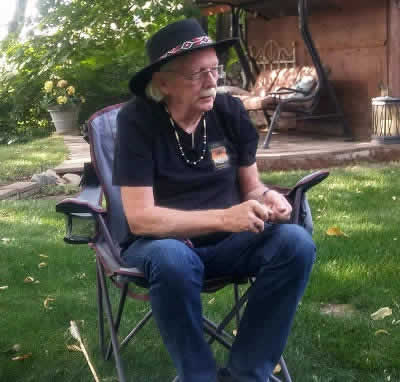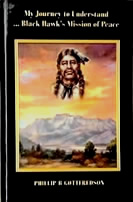 Author Phillip B Gottfredson
Author Phillip B Gottfredson
We can do nothing to change the past. But we can change the future. I am doing what I can to do that. It may not be much, but I can at least be the flea on the dog.
As for the Timpanogos, there can be no confusion. They were victims of genocide. The only thing they were 'guilty' of was being indigenous to the Americas. If you read the Timpanogos Biography, you understand what I mean.
As someone who has lived among the Native people for decades, I've been privileged to witness what it truly means to be a Native American. Their experiences and the challenges they face have been revealed to me. Our inculturation often blinds us, preventing us from seeing the harsh realities they confront every day due to our inherited racist and judgmental views. It's time we acknowledge their struggles and learn from them.
As I have written in my book Black Hawk's Mission of Peace, there is nothing about the Black Hawk War to make us proud. It's about the gritty realities of the human condition.
I found no evidence that my ancestors participated in violent acts—for that, I am grateful, but they were there standing on the ancestral homeland of the Timpanogos. My ancestors were part of colonialism and members of the LDS Church. They believed in living the teachings of Jesus. And even though they didn't like the moral hypocrisy of the church, they did nothing. They said nothing. They just did their job to establish the "Kingdom of God" and found a way to swallow their pride and stuff their feelings to get along. They did have compassion for the Native people on some level, for some befriended them and helped them on numerous occasions. But they hesitated to do more and feared the consequences if they did so.
Some people say that the sufferings of Native people are 'their own damn fault.' But I've lived decades among the Native people, and they've shown me what it truly means to be a Native American. It's crucial that we understand their experiences and the challenges they face. Our inculturation blinds us, preventing us from seeing the harsh realities they confront every day due to our inherited racist and judgmental views.
It is difficult for Native people to talk about their painful past, especially to non-Natives. And I can't blame them; they have been so demoralized and beaten down that it is tough to trust. And for many of us, it is difficult to face the truth that our ancestors were involved in such a horrible tragedy as the Black Hawk War in Utah.
There is much healing needed on both sides. Healing can only come from mutual respect, self-respect, and education. We need to find a common language that will bring us together as one people in a good way. Where we are free to live our lives without forcing individual beliefs upon one another, we should be able to walk our paths together with integrity, honesty, respecting each other, and being kind to each other.
Instead of arrogance, there should be humility, and instead of hate, there should be love. We should reach out to those suffering from the evils of the past. From our hearts, we should speak and listen. We need to talk, but we also need to listen, with our hearts.
It's crucial that we engage in mutual learning. We must grapple with the complexity of explaining to Indigenous people why our ancestors, who championed freedom and rebelled against aristocracy and supremacy, would come to America and strip the Native people of everything. Our ancestors arrived in America for a variety of reasons: some sought religious freedom, some were driven by the pursuit of wealth, and others were motivated by political reasons. But unlike our ancestors, Native Americans were already free. They were free to be themselves, to live authentically, and to be deeply connected in spirit to the natural world.
Three hundred years have gone by, and to this day, Native Americans continue to struggle for justice for the devastation of colonialism. It is disturbing that so many of us cling to the old ways of thinking that one is inferior and the other superior.
Race and Manifest Destiny were only excuses for Europeans to justify their greed and superiority. Beliefs that had evolved long before they encountered indigenous people.
It is time that our schools adhere to federal mandates, and teach the truth about our history in the spirit of equality, and explain compassionately the dynamics of the time that led to such a horrific human tragedy. Explanations give us the tools to bring change. We need to recognize that there is still much work to be done before we can say with a clear conscience that we live in a country that guarantees liberty and justice for all, and not just for some.
The time has come for us to return to the sacred teachings that our Creator gave us. Forgive ourselves and each other for our petty ways, and reconcile the past with mutual respect and understanding. Yes, we can learn to forgive—but we will never forget.
Visit: The Silent Victims
